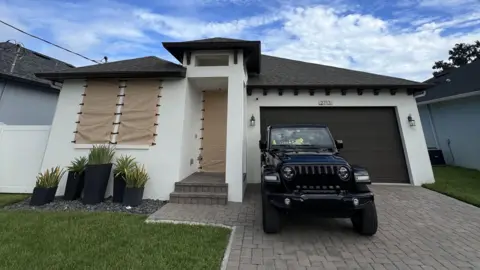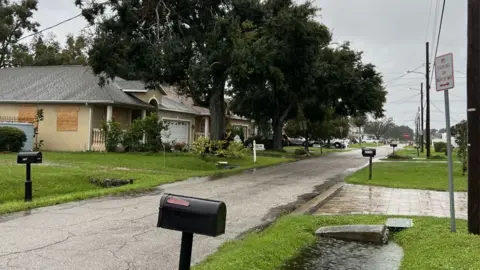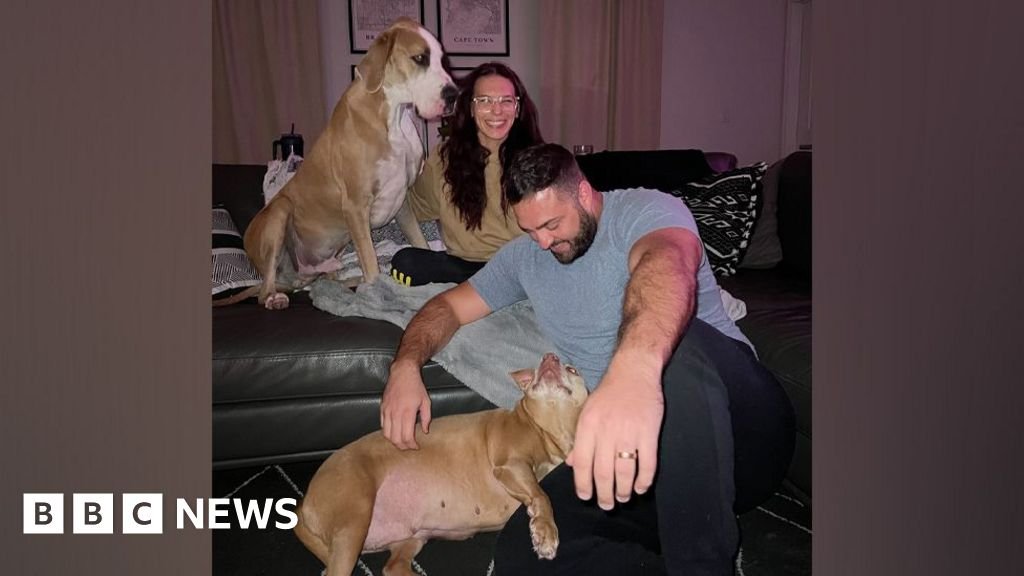[ad_1]
 Chynna Perkins
Chynna PerkinsFor days, Florida residents were pelted with warnings about a coming storm. Less than two weeks after Hurricane Helene thrashed the US south-east, Hurricane Milton was forecast to make landfall in heavily populated central Florida.
Officials urged residents around the state’s Gulf Coast to clear out, and move further inland.
In a dire message that echoed throughout the state, Tampa Mayor Jane Castor said Milton would be “literally catastrophic” to the coastal city.
“I can say without any dramatisation whatsoever: if you choose to stay in one of those evacuation areas, you are going to die,” she said.
But from her home in West Tampa, squarely in the path of the coming storm, Chynna Perkins decided to stay.
It was a gut instinct, she said, after years living through Florida’s storms. Twenty-five miles (40km) east of the sea, and half a mile west of Tampa’s Hillsborough River, she felt protected from any storm surge.
“And then, as far as evacuation zones, we’re in one of the last ones. So, you know, I’m not concerned,” she said.
With her husband, Sterling, she worried about finding accommodation for them both and their two large dogs. “With two dogs over 200lbs (91kg), it’s a big thing,” she said.
And she worried about taking up a hotel space for someone who needed it more.
“It just made more sense to stay here, and ride it out, knowing that our house will be safe. We can deal with the aftermath.”
Through a series of voice notes and calls, Perkins took BBC News through the storm as it barrelled through her community, bringing howling winds and saturating the area with rain.
Midday, Wednesday: ‘As prepared as we can be’
 Chynna Perkins
Chynna PerkinsThe morning in Tampa was typical, Perkins said. “When I woke up, it was grey, light drizzle. Nothing too major.”
She and Sterling had spent days preparing. They bought canned goods, sandwich supplies, water and extra dog food. They filled their bathtubs with water, charged their phones, emergency lamps and batteries.
“Our neighbourhood is boarded up,” she said. The historic homes in her West Tampa neighbourhood were half-hidden by plywood.
Her own home, a modern and neat single-storey house painted white, had temporary Kevlar covers on all the doors and windows. “We’re prepared as much as we can be,” she said.
By then, the forecasts were clear: Milton would sweep over and through Perkins’ home in just a few hours, pouring down rain, bringing wind gusts up to 97mph (156km/h).
But for now, she felt safe. “There’s no reason for us to be on the road taking up resources, and hotel rooms, and contributing to traffic and congestion,” she said. “We’re just riding it out, waiting to see what happens.”
14:30: Whipping wind and diagonal rain
Within hours, the weather seemed to have shifted for the worse. The skies above Perkins’ home had turned entirely grey.
“Rain and wind are definitely picking up, you can hear it,” she said, walking outside on her patio, where small pools of water had begun to form on her back lawn.
After four hours, little changed. At 17:30EDT (22:30BST), the rain became more intense, carried by the whipping wind diagonally through the sky.
“The wind is really starting to pick up,” Perkins said again. The wind roared over her voice, nearly drowning her out on the phone.
 Chynna Perkins
Chynna Perkins19:30: ‘Anxiety through the roof’
By this point, Milton’s eye was creeping towards the coast, just about an hour away from landfall.
“The wind is really starting to whip,” Perkins said. “We’re getting 20-30 minutes of really strong rain, then a dead period.”
Over the phone, she explained again her reasons for staying. Her home – a 10-minute drive west to the shore of Tampa Bay – would be safe from flash flooding, she felt.
“For us to flood here, the amount of rain would need to be astronomical,” she said. “There’s going to be rain, but it’s going to go back into the earth.”
“I have a good gut intuition. I feel like I’ve lived in Florida long enough, and I’ve been through hurricanes,” she said.
But there was still fear.
“My anxiety has been through the roof this whole time. I’m trying not to throw up thinking about it. It is very very eerie, just to see and hear how powerful it is,” she said.
“The anxiety comes from the waiting game. We’ve known for four days that this hurricane is coming. I just want to get through it so I can stop feeling this way.”
20:30: ‘Like we’re in a tornado’
Soon after Milton reached Florida, the lights went out.
“We’re still good, minus losing power, which we expected,” Perkins said. “It feels like we’re in a tornado, without the whistling sound. The winds are really, really whipping. We’ve already seen a few transformers blow in our neighbourhood just by looking out the back porch.”
They have no generator, so they played a game of Jenga in the dark. Sterling took up a temporary post by the sliding glass door that leads to their backyard. “He kind of went into the mode of ‘what happens in a worst case scenario,’” Perkins said.
She did not expect the storm to be so powerful. But she did not regret staying.
“There’s a kind of a relief, in the sense that it’s here.”
Morning, Thursday: Hoping for power soon
“Ok, morning after,” Perkins said, sending a video clip of her backyard. “We’ve got clear skies.”
It was windy still, she said, but no sight of any fallen trees and no real damage to her home.
“We fared the storm well,” she said. “You can hear people’s generators already kicking on and chainsaws in the background, so it sounds like people are already getting to work.”
But there was no power yet. Perkins’ home is close to Raymond James Stadium in Tampa, where members of the Hillsborough County Sheriff’s Department are being housed.
“I’m hoping that means we’ll get power sooner, rather than later.”

[ad_2]
Source link
Share this content:

